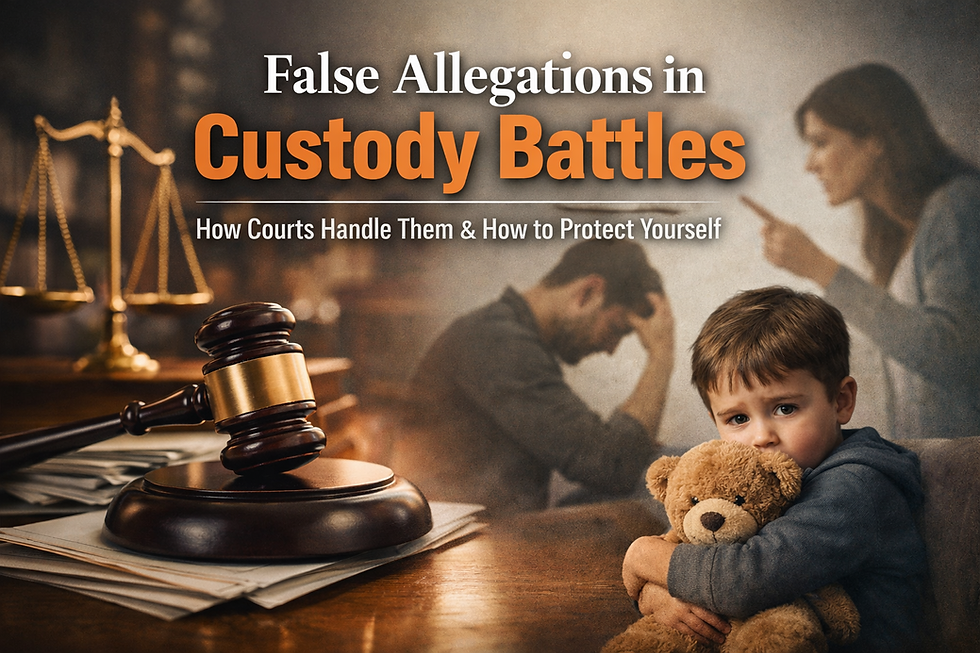Navigating Child Custody Jurisdiction When Parents Live in Different States
- Paul Tortora Jr.
- Sep 19, 2025
- 4 min read
Updated: Jan 12

Child custody disputes can become particularly complex when they involve multiple states, raising questions about which court has the authority to make decisions. The Uniform Child Custody Jurisdiction and Enforcement Act (UCCJEA) provides a framework to resolve these jurisdictional issues, ensuring that custody determinations are made in the child's best interests while minimizing conflicts between states. Adopted by New York and most other states, the UCCJEA helps prevent "forum shopping" where parents might seek a more favorable ruling in another jurisdiction. This blog post from a Syracuse child custody attorney breaks down the key UCCJEA rules on jurisdiction in custody matters.
What is the UCCJEA?
The UCCJEA is a uniform law designed to establish clear standards for determining which state has jurisdiction over child custody proceedings, including initial determinations, modifications, and enforcement of existing orders. The act applies to all child custody matters, including divorce, separation, guardianship, and paternity cases, and emphasizes cooperation between states to protect children from abduction or inconsistent rulings.
Its primary goals are to:
Prioritize the child's "home state" for jurisdiction.
Promote consistent enforcement of custody orders across state lines.
Discourage parental abduction by limiting jurisdiction shopping.
New York courts must adhere to these rules to assert or decline jurisdiction, and they are required to recognize valid custody orders from other UCCJEA states.
Initial Child Custody Jurisdiction
Under the UCCJEA, a New York court can make an initial custody determination only if it meets one of the following criteria, in order of priority:
Home State Jurisdiction: New York is the child's home state, meaning the child has lived here with a parent or person acting as a parent for at least six consecutive months immediately before the custody proceeding begins (or since birth for children under six months). If the child is temporarily absent from New York, it may still qualify as the home state.
Significant Connection Jurisdiction: If no state qualifies as the home state (or the home state declines jurisdiction), New York can assert jurisdiction if the child and at least one parent have a significant connection to the state beyond mere physical presence, and substantial evidence about the child's care, protection, and relationships is available here.
More Appropriate Forum: If all states with home state or significant connection jurisdiction decline because New York is deemed a more appropriate forum, jurisdiction can be assumed.
Vacuum Jurisdiction: As a last resort, if no other state has jurisdiction under the above criteria, New York can step in.
These rules ensure that custody decisions are made where the most relevant information is accessible, reducing the risk of conflicting orders.
Exclusive Continuing Jurisdiction
Once a New York court makes an initial custody determination under the UCCJEA, it retains exclusive continuing jurisdiction over the matter until:
The court determines that neither the child nor the parents have a significant connection to New York, and substantial evidence is no longer available here.
The court finds that the child and parents no longer reside in New York.
This provision prevents other states from modifying New York's orders unless New York relinquishes jurisdiction or the parties have fully relocated.
Jurisdiction to Modify Existing Orders
A New York court cannot modify a custody order issued by another state unless:
New York would have jurisdiction to make an initial determination.
The original state determines it no longer has exclusive continuing jurisdiction or that New York is a more convenient forum.
Neither the child nor the parents reside in the original state.
This strict rule promotes stability and discourages parents from relocating to seek better outcomes.
Temporary Emergency Jurisdiction
In urgent situations, such as when a child is subjected to or threatened with mistreatment or abuse, a New York court can exercise temporary emergency jurisdiction even if another state has primary jurisdiction. This allows for immediate protective orders, but they are temporary. The court must communicate with the home state court and may need to defer once the emergency is resolved.
Enforcement of Out-of-State Orders
New York must recognize and enforce valid custody determinations from other UCCJEA states as if they were issued locally. This includes expedited enforcement procedures, such as registering the order and seeking judicial assistance if needed.
Contact a Syracuse Child Custody Attorney Today
The UCCJEA's jurisdiction rules are essential for resolving cross-border custody disputes fairly and efficiently, but they can be intricate to apply. Missteps in determining jurisdiction can lead to dismissed cases or unenforceable orders, adding stress to an already difficult situation. If you're involved in a custody matter with interstate elements, understanding these rules is critical. As an experienced Syracuse child custody attorney, I can help you navigate jurisdictional challenges to protect your parental rights and your child's well-being. Contact us today for a confidential consultation to discuss your case.
For more information on child custody proceedings, please visit please visit our Child Custody and Frequently Asked Questions pages
Disclaimer: This blog post is for informational purposes only and does not constitute legal advice. Laws and guidelines can change, so always verify with current statutes or a professional.


